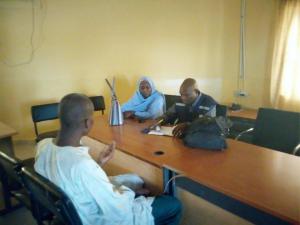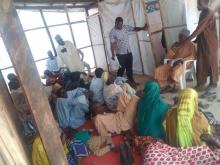Psychosocial Support – Borno State Government and WHO scale up efforts to fulfil unmet mental health needs
Maiduguri, 10 November, 2019 - After years of viewing gory sights of freshly injured victims from the frontlines of conflict ridden villages in North eastern Nigeria, a region which has witnessed almost a decade of devastating insurgency causing a humanitarian crisis Dr Ali Muhammad, a doctor at an internally displaced persons (IDP) camp clinic in Borno State became suicidal.
“The most depressing of all is watching innocent children breathe their last in your hands, a death they did absolutely nothing to deserve. I honestly need psychological help because witnessing these kinds of scenes repeatedly for years can weigh one down emotionally”, he adds.
Dr Muhammad is one of the 41 000-plus people being treated for various mental health conditions through the WHO Mental Health Global Action Programme Intervention Guide (mhGAP-IG) programme in collaboration with the Borno State Government.
As a significant proportion of the conflict affected population is in need of mental health services, with many harbouring suicidal thoughts, the Borno State Government and WHO is scaling up efforts to fulfil unmet mental health needs in the State. Furthermore, the partnership is offering psychosocial support to victims and indigenes of conflict affected areas at the primary health care level and in IDP camp clinics.
Through integration of mental health services in primary health care settings, as of July 2019, the WHO-Government Mental Health and Psychosocial Support Sub Working Group (MHPSS SWG) programme covered 41 health facilities in 10 accessible local government areas (LGAs). The intervention provides supportive supervision at primary healthcare centres (PHC) on a weekly basis. The mhGAP training, one of WHO’s key interventions, is a program designed by WHO to train non-specialised health workers in mental health and build their capacity to handle basic mental, neurological and substance use disorders.
“So far, we conducted consultation for 41,220 mental health patients and patients with other morbid illness in a span of 1,866 sessions. In addition, we referred a total of 2 5
39 patients for further management, with 753 treated as inpatients”, says Dr Samuel Tarfa, WHO Mental Health Officer, Borno State, Nigeria.
“As of July 2019, 1 331 patients were treated for mental retardation and intellectual disability, 5 486 for Psychotic disorders and 8 403 for severe emotional disorders. Other illnesses treated include, epilepsy and seizure disorders (10 339), alcohol and other substance use disorders (2975) medically unexplained somatic complaint (5 279) and other psychological complaints (2 142)”, he states.
Commemoration of World Mental Health Day
On 10 October 2019, Nigeria joined the world to commemorate World Mental Health day with the theme, ‘suicide prevention’
Speaking on mental health and suicide prevention, Dr Salisu Aliyu Kwaya Bura, the Borno State Commissioner of Health said, “We have already appointed one mental health programme officer at the State Ministry of Health and a mental health desk officer each at the Hospitals Management Board (HMB) and State Primary Health Development Agency(SPHCDA), to oversee and operationalize the Borno State Mental Health Strategic Framework (BMHSF) developed with the support of WHO.”
He additionally stated, “We are collaborating with the Mental Health and Psychosocial Support Sub Working Group (MHPSS SWG) and other stakeholders to observe this year’s World Mental Health Day by sensitizing our people on the reality of suicide and preventive measures”.
Dr Bura also acknowledged WHO for the enormous support they provided on specialized mental health care and reiterated that Borno State looks forward to more fruitful partnerships to tackle mental health issues and prevent further cases of suicide in the state.
Defined as ‘the act of taking one’s own life’, suicide remains a serious public health issue, with a a strong linkage with mental health problems. Nigeria reported 17.3 suicides per 100,000 people in 2018 (Source: WHO).
Suicide is preventable especially with timely, evidence-based low-cost interventions and WHO is committed to working with Government to ensure no human dies through suicide or any mental health issue.
Technical Contacts:
Dr Ifeanyi Okudo; Email: okudoi [at] who.int (okudoi[at]who[dot]int); Tel: 08034020833
Dr Samuel Tarfa, Email: tarfas [at] who.int (tarfas[at]who[dot]int) ; Tel: +2348035017526




